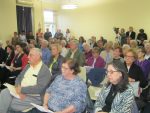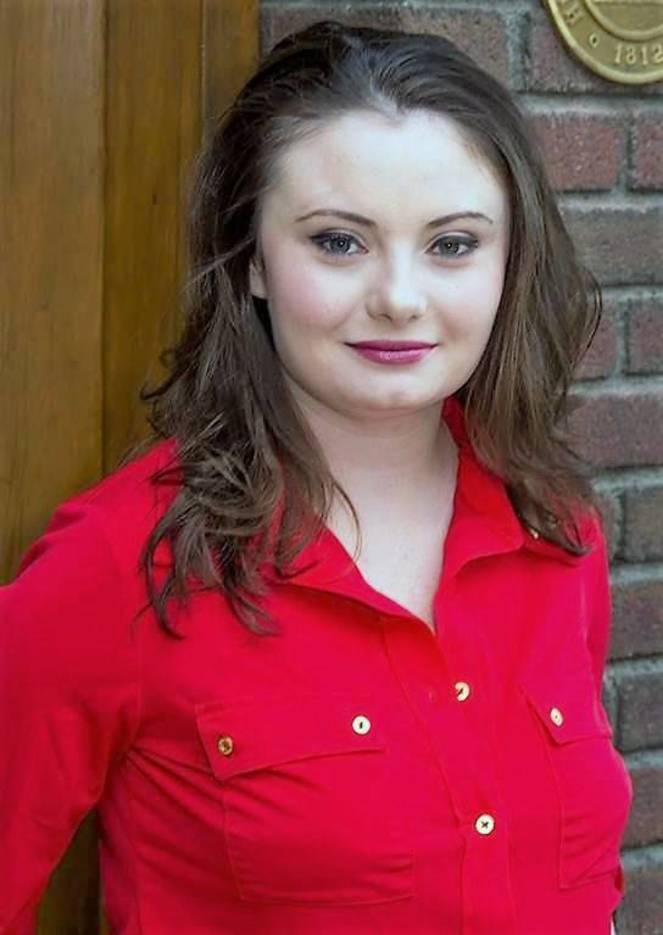Residents Pressure Mt. Kisco Officials to Oppose Senior Housing Plan

More than 100 residents overwhelmingly panned a developer’s proposal last week to buy 17.7 acres of village-owned land on Kisco Avenue and develop a 129-unit senior housing complex.
The project’s fate is unclear after village board members expressed differences following a marathon public hearing last week at Village Hall.
Following the four-hour hearing on May 15, Mayor Michael Cindrich said he supported the development, Trustee Peter Grunthal said he was opposed and trustees Anthony Markus, Karen Schleimer and Jean Farber said they either had additional questions or sought more public input.
The board voted unanimously to adjourn the hearing until June 5.
In March, the board appeared to agree to sell the property to HFZ Capital, but more than two months later the contract remains unsigned. Last month, HFZ Capital threatened litigation if the village failed to follow through on the sale.
At last week’s hearing, most residents urged village officials to preserve the Kisco Mountain hillside where the project would be built. Resident John Rhodes said the land sought by the developer was unsuitable for the project and that Radio Circle would be a more appropriate site for new senior housing.
Also, nearly one-third of the roughly five acres that the developer would build on consists of “very steep slopes,” Rhodes said.
The property should be transferred to an entity that would preserve the land, he said.
Village Historian Harry McCartney implored officials to oppose the sale, saying it was their responsibility to make “the village a better place than it is now.”
A resident, who declined to identify herself, read a letter on behalf of several residents who stated Cindrich should recuse himself on the issue because he could benefit from the sale, thereby violating ethics laws.
“The mayor, as a contiguous property owner and currently the closest resident to the project, would benefit more than any other property owner in our village,” the woman said. “It would place the development as far back as possible from the mayor’s house, more than 1,000 feet from the mayor’s home, out of view, over the ridge and establishing a 40-acre permanent preserve directly outside the mayor’s backyard.”
Cindrich said the issue was resolved several years ago by the village’s Board of Ethics.
“After several months, they came back with a decision that I did not have any conflict of interest,” Cindrich said. “And what you are saying is absolutely absurd because we would have no planning board. We would have nothing in this village if everybody who lives next to a piece of property was precluded (from) voting on it.”
Village trustees were divided on the proposal. Grunthal agreed with most in the crowd, contending that the property should be kept undeveloped after being transferred to a preservation group. The loss of potential revenue, which he said would be minimal for the village, does not justify damaging the mountain.
“This project will be an environmental disaster,” he said.
Village Assessor Roger Miller has estimated the annual property taxes could be as high as $200,000 for the village, $360,000 for the Bedford schools and $90,000 for the county.
Schleimer said to her knowledge there was no contract in place to sell the land and she was unaware if there has been a recent appraisal of the property. The trustees must be assured there will be fair value returned for any sale, she said.
Cindrich said the proposed development would provide “a country club-like setting” that would be close to medical facilities.
“I guess the dynamics have changed,” he said. “The agreement that this entire board signed off on apparently is not enough now and I’m surprised they signed off on it.”
Markus and Farber said they had not made a decision whether to support the sale and wanted to hear more from the public before making a decision. Markus urged residents to weigh in before the hearing closes.
Anthony Veneziano, an attorney representing the applicant, disputed Grunthal’s environmental disaster claim should the project be built. He said the potential impacts were previously studied by the planning board for three years, and a findings statement was approved in July 2015.
During the hearing, Veneziano said the project would provide the village with $4.1 million through the sale of the property in addition to the fresh tax revenue.
Cindrich said a proposal for senior housing for Radio Circle “was never on the table” because the developer wanted assurances on a zoning change before analysis of potential environmental impacts.
The village board has also rejected a previous proposal for a senior housing facility on property owned by the Boys & Girls Club of Northern Westchester because of concerns raised by neighboring residents, he said.
Though most speakers opposed the sale of the property last week, the project did have a few supporters. Linda Cindrich, the mayor’s wife, said the transaction would provide the village more than $4 million and return the property to the tax rolls.
Also, most of the land – about 12 acres – would remain undeveloped, she said.
The mayor instructed representatives of the developer to answer the board’s questions in writing.


